Can HMD’s Better Phone Project shift the dial on excessive smartphone use?
Human Mobile Devices wants to explore ways to diffuse the digital deluge affecting young people’s mental health, and it’s looking for everyone’s help

We use our phones way too much. An increasing number of studies are pointing to the flipside of the smartphone; addiction, anxiety, depression and more have all been attributed to the ubiquity of modern communications technology. Yet there’s still no magic behaviour changing bullet, no smartphone equivalent of the 1964 ‘Smoking and Health’ report from the US Surgeon General that blew away decades of tobacco industry hem-hawing.
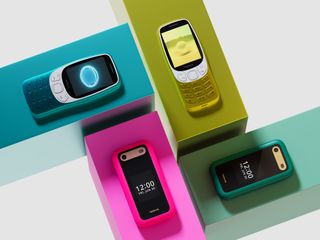
Dumbing down: Nokia 3210 and Nokia 2660
We’re not suggesting that mobile phones have a similar toxicology, but it’s worth noting that no major manufacturers have commissioned any research into the (potentially) adverse effects of their products. Until now. Human Mobile Devices’ (HMD’s) The Better Phone Project was launched today.
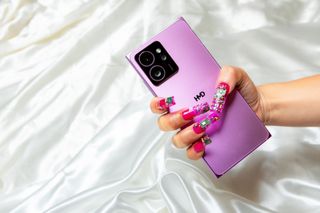
HMD Skyline in Neon Pink
As we’ve previously noted, the Finnish phone maker (and steward of the Nokia brand), has a bit of a bee in its bonnet about the negative effect of smartphones. On the eve of the launch of their latest device, the HMD Skyline, we spoke with CMO Lars Silberbauer and head of product Adam Ferguson, to find out more about the project.
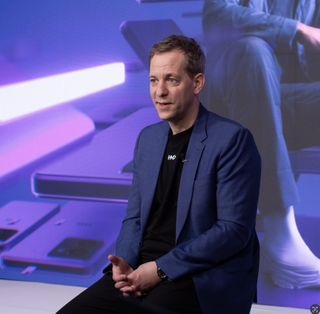
Lars Silberbauer, CMO of HMD
‘None of our competitors are doing this,’ Silberbauer notes, describing how the legacy of Nokia’s rugged but light-featured ‘dumb phones’ are becoming more and more fashionable as people seek out devices without onboard distractions. The CMO explains that the firm's forthcoming Barbie-branded phone will ship with no social media functionality at all. Other socially conscious brands may want to follow suit.

HMD's Lars Silberbauer with Isabel Ferrer, EMEA Marketing Director at Mattel
That’s not all, however. Although scientific studies have hinted but not conclusively proved a correlation between smartphones, social media and mental health issues, few parents or young people would dispute that doom-scrolling can be just that, or that digital detox is a real thing.
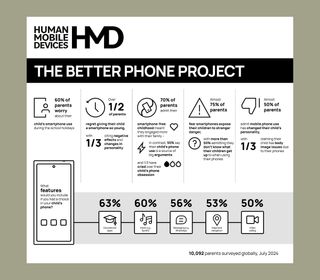
The Better Phone Project has already generated some eye-popping research
‘By the age of 12, 97 per cent of UK children have a phone,’ says Ferguson, adding that in the US, ‘95 per cent of 13- to 17-year-olds use social media.’ Ferguson points out that Gen Z and Gen Alpha aren’t waiting around for the Surgeon General. ‘They know this is a problem.’ What’s also a problem is that phones themselves are convenient, shiny, delightful, addictive but also essential for many aspects of modern life.
However, this all comes with an unseen cost. HMD’s own recent research (talking to 10,000 parents in the UK, Europe, US, India and Australia) revealed that over half of parents wished they’d waited long before they gave a device to their children. And finally, most heartbreakingly of all, ‘over half of parents think that phones have changed their child’s personality.’
Wallpaper* Newsletter
Receive our daily digest of inspiration, escapism and design stories from around the world direct to your inbox.
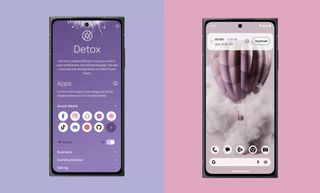
The HMD Skyline's forthcoming Detox mode
So what is the Better Phone Project? The topline is that it’ll ultimately result in a new device that’ll address some of the above issues. It will definitely be a challenge. Deliberately dull and boring devices have been tried before, and whilst they might have cult cachet, they have to contend with FOMO, peer pressure, status envy and all the other social complexities that accompany relentless conspicuous consumption of annually updated smartphones. Worse still, attempts to divert, block or even police phone use can often end up becoming a full time job for the 'authorities'.
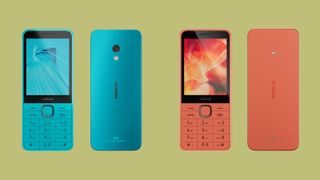
Is simplicity the answer? The Nokia 235 and Nokia 215 from HMD
Ferguson acknowledges that current solutions boil down to choice versus control, and neither are optimal. However, HMD believes they can achieve something where so many others have failed. ‘Within a year, we’ll launch something that addresses this in some way,’ he says. That ‘something’ will be the ‘first phone co-created for children by parents to protect their mental wellbeing,’ a lofty and ambitious goal that few parents would criticise.
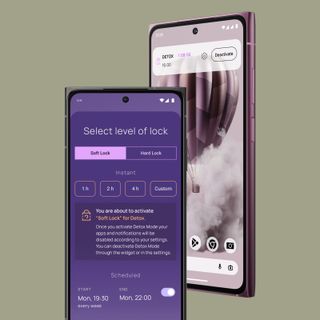
The HMD Skyline's forthcoming Detox mode
Perhaps HMD is the only company that could take this on. Not only is it one of the world leaders when it comes to making desirable dumbphones, but the Skyline will shortly be given a bespoke Detox function, one of the first devices to have this baked into the OS.
The company will be soliciting help from everyone it can, from experts and campaigners to parent support groups, to everyday phone owners old and new. Right now, the situation feels fairly hopeless – we’ve apparently all surrendered to the technology. As Dr Becky Foljambe, founder of the lobbying firm Health Professionals for Safer Screens, says, ‘Exploring the depth and breadth of emotion alongside the need for solutions (when 38 per cent parents are feeling there are “no solutions” according to the research results), makes this a very meaningful and impactful initiative by HMD.’
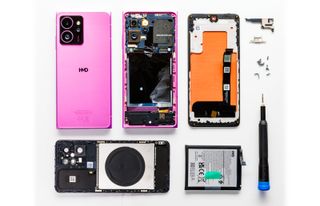
Exploding the world of smartphone use: HMD Skyline
A better phone? Tune in to find out whether dropping out could even be an option.
More information about the Better Phone Project can be found at HMD.com
Jonathan Bell has written for Wallpaper* magazine since 1999, covering everything from architecture and transport design to books, tech and graphic design. He is now the magazine’s Transport and Technology Editor. Jonathan has written and edited 15 books, including Concept Car Design, 21st Century House, and The New Modern House. He is also the host of Wallpaper’s first podcast.
-
 Shigeru Ban wins 2024 Praemium Imperiale Architecture Award
Shigeru Ban wins 2024 Praemium Imperiale Architecture AwardThe 2024 Praemium Imperiale Architecture Award goes to Japanese architect Shigeru Ban
By Ellie Stathaki Published
-
 Stone Island and New Balance team up for this year’s most sought-after sneaker
Stone Island and New Balance team up for this year’s most sought-after sneakerPart of Stone Island’s monochromatic ‘Ghost’ line, the collaboration is inspired by both brand’s longtime links with British subculture
By Jack Moss Published
-
 Step inside Apple Park Observatory, the tech giant's new hub for events and innovation in Cupertino
Step inside Apple Park Observatory, the tech giant's new hub for events and innovation in CupertinoApple Park Observatory, unveiled in Cupertino, adds to the tech giant's expansive campus by Foster + Partners in California
By Ellie Stathaki Published
-
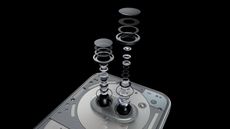 Nothing explodes its mid-range masterpiece to create the Nothing Phone (2a) Plus
Nothing explodes its mid-range masterpiece to create the Nothing Phone (2a) PlusWe get our hands on the new Nothing Phone (2a) Plus, an upgraded and enhanced smartphone that promises a better photographic experience, smarter software and more
By Jonathan Bell Published
-
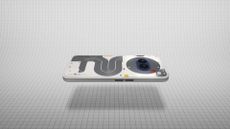 Nothing's first limited edition smartphone is 'a story of colour'
Nothing's first limited edition smartphone is 'a story of colour'The Nothing Phone (2a) Special Edition gets back to basics with a simple primary colour scheme to accentuate Nothing’s different design approach
By Jonathan Bell Published
-
 The Google Pixel 8a is an AI-driven ‘beginner’s smartphone’ that eclipses its pricier rivals
The Google Pixel 8a is an AI-driven ‘beginner’s smartphone’ that eclipses its pricier rivalsWe get our hands on Google’s latest device, the mid-range Pixel 8a, a stripped-down smartphone that still packs an excellent camera, solid hardware and an AI-powered software punch
By Jonathan Bell Published
-
 Huawei exhibition celebrates the power of smartphone photography
Huawei exhibition celebrates the power of smartphone photographyHuawei XMAGE, the smartphone innovator’s mobile imaging arm, curates a photography exhibition that highlights the creative power of its technology
By Simon Mills Published
-
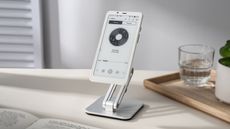 Dial into the Boring Phone and more smartphone alternatives
Dial into the Boring Phone and more smartphone alternativesFrom the deliberately dull new Boring Phone to Honor’s latest hook-up with Porsche, a host of new devices that do the phone thing slightly differently
By Jonathan Bell Published
-
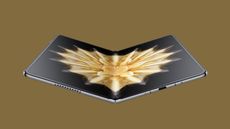 Honor Magic V2 smartphone wants to lure you into the ultra-high-end fold
Honor Magic V2 smartphone wants to lure you into the ultra-high-end foldThe Honor Magic V2 boasts the thinnest profile of any folding smartphone on the market, cramming three cameras and a long-life battery into this dual-screen device
By Jonathan Bell Published
-
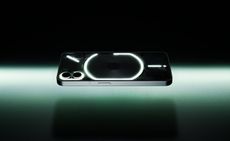 Hands on with new Nothing Phone (1): a clearly different smartphone
Hands on with new Nothing Phone (1): a clearly different smartphoneNothing Phone (1) launches, hitting the sweet spot between price, performance, and efficiency, and promoting the simplification of your smartphone life
By Jonathan Bell Published
-
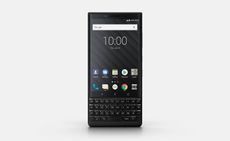 BlackBerry KEY2: the ‘defiantly different’ smartphone everyone’s talking about
BlackBerry KEY2: the ‘defiantly different’ smartphone everyone’s talking aboutBy Elly Parsons Last updated